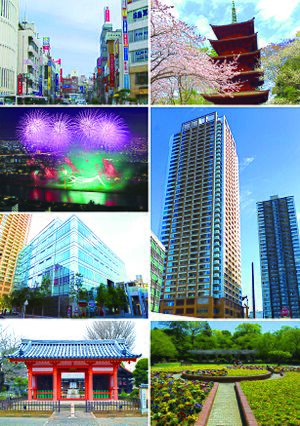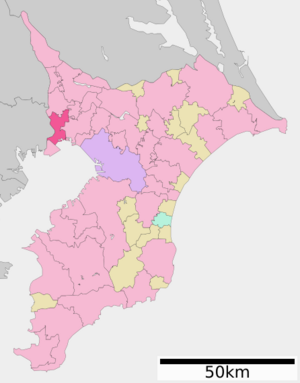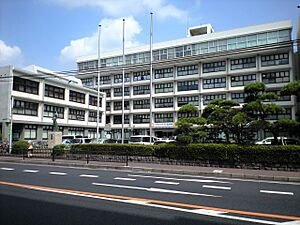Ichikawa, Chiba facts for kids
Quick facts for kids
Ichikawa
市川市
|
||||||||
|---|---|---|---|---|---|---|---|---|

|
||||||||
|
||||||||

Location of Ichikawa in Chiba Prefecture
|
||||||||
| Country | Japan | |||||||
| Region | Kantō | |||||||
| Prefecture | Chiba | |||||||
| First official recorded | 100 AD (official) | |||||||
| Town settled | April 1, 1889 | |||||||
| City settled | November 3, 1934 | |||||||
| Area | ||||||||
| • Total | 57.45 km2 (22.18 sq mi) | |||||||
| Population
(January 31, 2024)
|
||||||||
| • Total | 492,749 | |||||||
| • Density | 8,577.0/km2 (22,214.3/sq mi) | |||||||
| Time zone | UTC+9 (Japan Standard Time) | |||||||
| - Tree | Pinus thunbergii | |||||||
| - Flower | Rose | |||||||
| - Bird | Cettia diphone | |||||||
| Phone number | 047-334-1111 | |||||||
| Address | 1-1-1 Yawata, Ichikawa-shi, Chiba-ken 272-8501 | |||||||
Ichikawa (市川市, Ichikawa-shi) is a city in western Chiba Prefecture, Japan. As of January 31, 2024, about 492,749 people lived here. The city covers an area of 57.45 square kilometers (22.18 sq mi).
Ichikawa is well-connected to Tokyo by trains and roads. This makes it a popular place for people who work or study in Tokyo to live.
Contents
Geography of Ichikawa
Ichikawa is in the northwest part of Chiba prefecture. It is about 20 kilometers (12 miles) from Chiba, the capital of the prefecture. It is also very close to the center of Tokyo, only 10 to 20 kilometers away.
The Edogawa River forms the western border of the city. This river separates Ichikawa from the Edogawa area of Tokyo.
Land and Water
The southern part of Ichikawa is a flat area called an alluvial plain. It is only about two meters (6.5 feet) above sea level. The northern part is higher, forming part of the Shimosa Plateau. This area is about 20 meters (65 feet) above sea level. The highest point in Ichikawa is 30.1 meters (98.7 feet) in Satomi Park. Some parts of the city are built on land that was reclaimed from the sea.
Neighboring Cities
Ichikawa shares borders with several other cities:
- In Chiba Prefecture:
- Urayasu
- Funabashi
- Matsudo
- Kamagaya
- In Tokyo:
Climate in Ichikawa
Ichikawa has a humid subtropical climate. This means it has warm summers and cool winters. There is usually little to no snow.
The average temperature each year is about 15.4°C (59.7°F). The city gets about 1404 mm (55 inches) of rain per year. September is usually the wettest month. August is the warmest month, with temperatures around 27.0°C (80.6°F). January is the coldest, with temperatures around 4.9°C (40.8°F).
Population Growth
Over the last 100 years, the number of people living in Ichikawa has grown a lot. The population has increased by about 15 times!
| Historical population | ||
|---|---|---|
| Year | Pop. | ±% |
| 1920 | 31,676 | — |
| 1930 | 52,972 | +67.2% |
| 1940 | 75,257 | +42.1% |
| 1950 | 120,565 | +60.2% |
| 1960 | 157,301 | +30.5% |
| 1970 | 261,055 | +66.0% |
| 1980 | 364,244 | +39.5% |
| 1990 | 436,596 | +19.9% |
| 2000 | 448,642 | +2.8% |
| 2010 | 473,919 | +5.6% |
| 2020 | 496,676 | +4.8% |
History of Ichikawa
People have lived in the Ichikawa area for a very long time. Stone tools found here are about 30,000 years old. Many ancient shell middens (piles of shells from old settlements) from the Jōmon period have been discovered. Hundreds of burial mounds from the Kofun period are also found nearby.
Early History
During the Nara period, Ichikawa was an important place. It was the capital of Shimōsa Province. The city is even mentioned in an ancient Japanese poetry collection called the Man'yōshū.
Later, during the Heian period, this area was where a famous rebellion led by Taira Masakado took place. In the Sengoku period, a big battle called the Battle of Kōnodai happened here. It was fought between the Satomi clan and the Later Hōjō clan.
Modern Ichikawa
In more recent times, Ichikawa was part of some smaller battles during the Boshin War. This war led to the Meiji Restoration. Ichikawa Town was officially created in 1889.
On November 3, 1934, Ichikawa merged with nearby towns and a village. This formed the city of Ichikawa as we know it today. The city grew even more by adding other villages and towns in 1949, 1955, and 1956.
Economy and Life in Ichikawa
In the Meiji period, Ichikawa was a popular place for important people to live. Many politicians, business leaders, and artists chose Ichikawa. It had some of the most valuable land in Chiba Prefecture.
Many famous writers and poets have lived in Ichikawa or written about it. These include Soseki Natsume, Shiki Masaoka, and Yukio Mishima.
Modern Development
Today, the areas around Ichikawa Station and Motoyawata Station are busy commercial centers. You can find many tall apartment buildings, shops, and company offices here. The area around Motoyawata Station is also where many city offices, like the city hall, are located.
The Gyotoku district in the south used to have salt farms. Now, it has become a modern residential area with good train access to Tokyo. The bay area is an industrial zone. It has many factories and warehouses, making it an important distribution hub.
Transportation in Ichikawa
Ichikawa has excellent public transportation. Many train lines and highways pass through the city, connecting it to Tokyo and other parts of Japan.
Train Lines
 JR East – Sōbu Line (Rapid)
JR East – Sōbu Line (Rapid)
- Ichikawa
 JR East – Chūō-Sōbu Line
JR East – Chūō-Sōbu Line
- Ichikawa - Motoyawata
 JR East – Musashino Line
JR East – Musashino Line
- Ichikawa-Ōno
 JR East – Keiyō Line
JR East – Keiyō Line
- Ichikawa-Shiohama - Futamata-Shimmachi
 Keisei Electric Railway - Keisei Main Line
Keisei Electric Railway - Keisei Main Line
- Kōnodai - Ichikawa-Mama - Sugano - Keisei Yawata - Onigoe
 Tokyo Metropolitan Bureau of Transportation - Shinjuku Line
Tokyo Metropolitan Bureau of Transportation - Shinjuku Line
- Moto-Yawata
 Tokyo Metro - Tōzai Line
Tokyo Metro - Tōzai Line
- Minami-Gyōtoku - Gyōtoku - Myōden
 Hokusō Railway - Hokusō Line
Hokusō Railway - Hokusō Line
- Kita-Kokubun - Akiyama - Higashi-Matsudo - Matsuhidai - Ōmachi
Major Highways
 Higashi-Kantō Expressway
Higashi-Kantō Expressway Keiyō Road
Keiyō Road Bayshore Route
Bayshore Route National Route 14
National Route 14 National Route 298
National Route 298 National Route 357
National Route 357 National Route 464
National Route 464
Education in Ichikawa
Ichikawa has many schools and universities, offering education from elementary to college level.
Universities and Colleges
- Chiba University of Commerce
- Wayo Women's University
- Tokyo Medical and Dental University (Ichikawa campus)
- Showagakuin Junior College
- Tokyo Management College
Schools for Younger Students
Ichikawa has:
- 39 public elementary schools and 3 private elementary schools.
- 27 public junior high schools.
- 5 private schools that combine middle and high school, like Ichikawa Gakuen.
- 7 public high schools and 2 private high schools.
Sister Cities
Ichikawa has special partnerships with cities around the world. These are called "sister cities" or "twin towns." They help promote friendship and understanding between different cultures.
 Gardena, United States (since 1962)
Gardena, United States (since 1962) Issy-les-Moulineaux, France (since 2012)
Issy-les-Moulineaux, France (since 2012) Leshan, China (since 1981)
Leshan, China (since 1981) Medan, Indonesia (since 1989)
Medan, Indonesia (since 1989) Rosenheim, Germany (since 2004)
Rosenheim, Germany (since 2004)
Fun Places to Visit in Ichikawa
Ichikawa has many interesting places for people to visit and enjoy.
- Nakayama Hokekyō-ji: This is a Buddhist temple with very old and important buildings. Some parts, like a gate and a hall, are from the Sengoku period. It also has a Five-story Pagoda built in 1622.
- Katsushika Hachiman Shrine: A Shinto shrine that was built a long time ago during the Heian period.
- Osu Disaster Prevention Park: This park is a great place for recreation and relaxing. But it's also designed to be a safe place for people to go during a disaster.
- Satomi Park: One of Ichikawa's main parks. It's on a hill near the Edo River and is famous for its beautiful cherry trees.
- Wild Bird Observatory: Here, you can use telescopes to watch birds. There's also an exhibition room to learn about them.
- Zoological & Botanical Garden: This garden is home to about 70 different kinds of animals. You can see small animals like lesser pandas and orangutans. Nearby, there's a Natural Museum and a Nature Park with a Rose Garden.
- Teramachi-dori: This street used to be called "Narita Road." Pilgrims (people on a religious journey) would use it to go to Narita-san Temple.
- Guhō-ji and Mama Well: These are old, historic spots. The Mama Well is even mentioned in an ancient poem!
- Higashiyama Kaii Memorial Hall: This building looks like it's from Germany, where the artist Higashiyama studied. It's a two-story building with an octagonal tower.
- Lifelong Learning Center: Also known as "Media Park Ichikawa," this center helps people of all ages learn new things. It has a big Central Library, an Audio Visual room, and a Children's Hall.
- Clean Spa Ichikawa: This unique facility uses heat from burning garbage to power a swimming pool, warm baths, and a gym.
Famous People from Ichikawa
Many talented people come from Ichikawa, including athletes, artists, and performers.
- Masa Takanashi, professional wrestler
- Sakaigawa Namiemon, sumo wrestler
- Wakashima Gonshirō, sumo wrestler
- Kōji Nakano, novelist
- Kuniko Inoguchi, Cabinet minister
- Michio Hoshino, photographer
- Kazuki Kosakai, comedian
- Yūko Andō, newscaster
- Koji Ishikawa, illustrator
- Taiji, musician
- yukihiro (musician), musician
- Kazuo Takahashi, mixed martial artist
- Shigeki Maruyama, professional golfer
- Oginishiki Yasutoshi, sumo wrestler
- Tomo Sakurai, voice actress
- Tōki Susumu, sumo wrestler
- Ryoji Aikawa, professional baseball player
- Ryoji Aikawa, professional soccer player
- Kazushige Nosawa, professional wrestler
- G.G. Sato, professional baseball player
- Moe Oshikiri, fashion model
- Yuki Abe, professional soccer player
- Atsuko Maeda, singer, actress, former member of AKB48
- Norimitsu Onishi, journalist
- Tatsuhisa Suzuki, voice actor
- Peter Takeo Okada, Roman Catholic Archbishop of Tokyo
- Yoko Narahashi, film producer and casting director
- Tao Okamoto, actress and model
- Yoshino Takamori, voice actress
 In Spanish: Ichikawa (Chiba) para niños
In Spanish: Ichikawa (Chiba) para niños
 | Misty Copeland |
 | Raven Wilkinson |
 | Debra Austin |
 | Aesha Ash |





